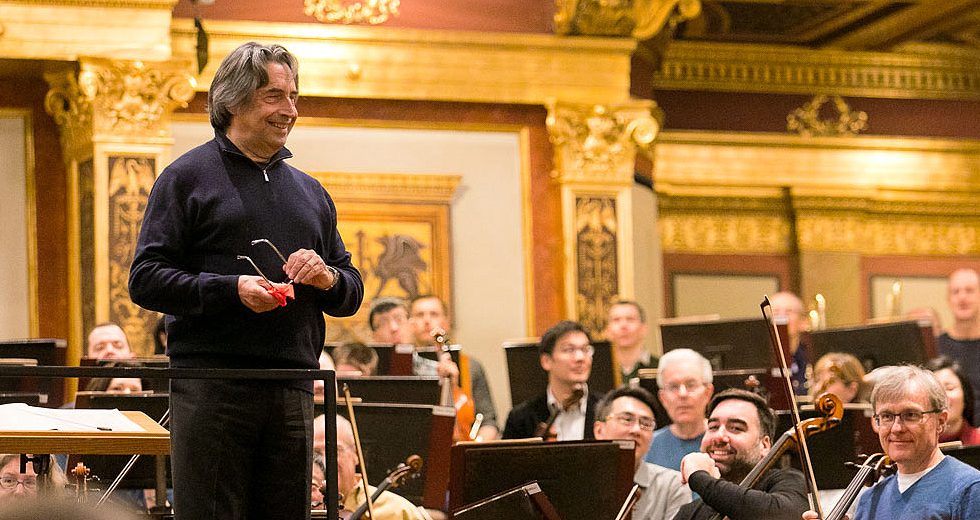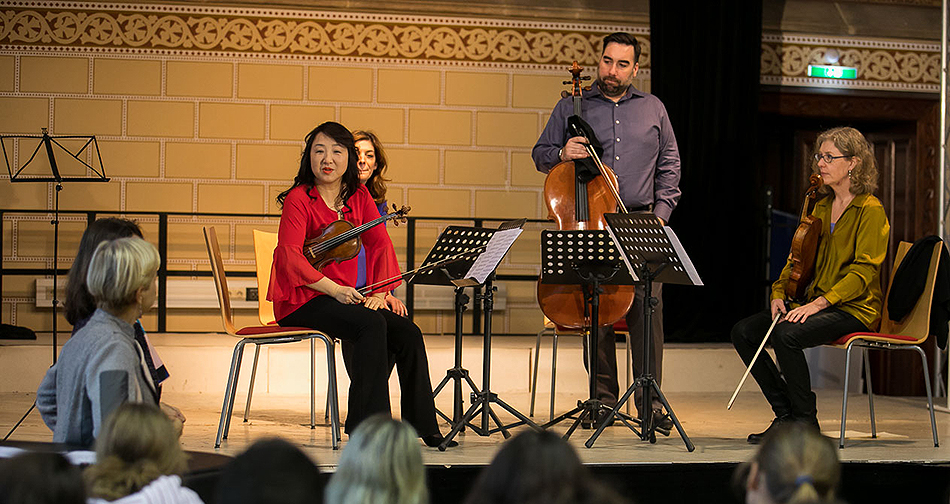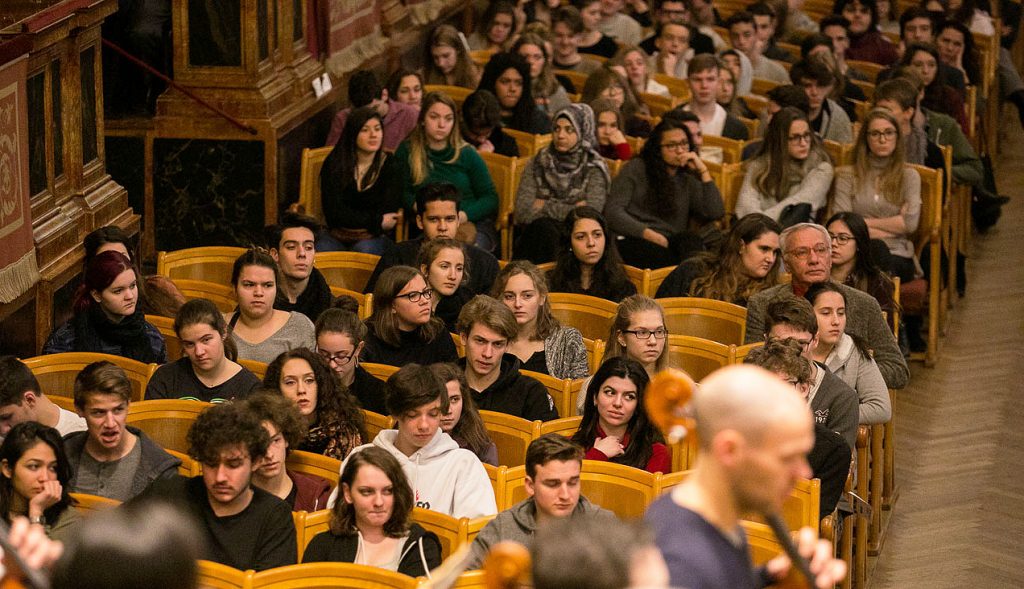
VIENNA — The really important questions transcend time and place. Whether the musicians of the Chicago Symphony Orchestra are interacting with kids in Chicago or Beijing, or here on the hallowed ground of Mozart and Beethoven, come Q&A time, fascinated youngsters always get down to the basics.
Like when did you know you wanted to be a professional musician? After savoring a generous serving of chamber music by Mozart, Dvořák and Ravel brought to their classroom at the Akademisches Gymnasium Wien by four CSO string players, a group of Austrian teenagers, encouraged to ask anything at all, opened with the epiphany question: When did it hit you, and what sparked the realization that this was what you wanted to do with your life?

The CSO’s Yuan-Qing Yu, Gina DiBello, Ken Olsen and Diane Mues take questions after a performance at the Akademisches Gymnasium Wien. | © Todd Rosenberg Photography 2017
Essentially, the four Chicago musicians — assistant concertmaster Yuan-Qing Yu, violinist Gina DiBello, violist Diane Mues and assistant principal cellist Kenneth Olsen — all offered variations on a personal trope. When they broke out of their local, childhood “bubble,” as Olsen put it, and went off to music camp, each of them found other young people who shared their seriousness, their commitment, their passion about making music. That was the key, the switch, the springboard.
Wherever the CSO may tour, its musicians share their personal spark with youngsters. The connection may be on the level of appreciation and some chat, as in this performance at the school, or in master classes for advanced students, which several CSO players conducted at the Paris Conservatoire at the beginning of the current European tour. And sometimes the kids get the chance to observe the whole band, as some 300 Vienna-area students did when music director Riccardo Muti led an open rehearsal at the famed Musikverein.
Hard to know what the youngsters expected when the CSO’s celebrated conductor strolled onto the stage, dressed all in casual black, baton in hand. It’s pretty certain they weren’t looking for what came next.
Channeling his inner Victor Borge, Muti kibitzed for a moment with concertmaster Robert Chen, then whipped around, leaned forward onto the podium rail, and with a sly shifting of his eyes, acknowledged one small forward section of music students. The disarmed students broke up with laughter, and Muti doubled down on his schtick. He asked how many were woodwind players, how many played violin, cello — viola, anyone? Yup, one violist.
Now came the maestro’s crucial query: Did any of these aspiring musicians actually aspire to conduct? A couple of hands went up amid much laughter. “Bene, bene,” quoth the iconic figure on the podium, who no longer seemed so imposing. It was time for a conducting lesson. (The CSO rehearsal could wait.)
“There are many ways to conduct,” Muti said, whereupon he turned and crouched and leaped while flailing his baton: The orchestra burst into the opening phrases of Strauss’ Don Juan. Next came a more subtle cue, a mere flick of the wrist, which produced the same gorgeous result. “If you don’t know what to do, just do this and something will happen,” Muti concluded as he took the baton in his left hand and made a big up and down motion, like pumping water. Sure enough, that magical Strauss erupted once more.

High-school students attend an open rehearsal featuring Riccardo Muti and the CSO at Vienna’s Musikverein. | © Todd Rosenberg Photography 2017
When the rehearsal ended, several students pulled out CDs and headed toward the stage in hope of getting Muti’s autograph. The maestro didn’t notice them at first; then one of his musicians tugged at his sleeve and pointed. In a twinkling, the conductor pulled a chair to the edge of the stage and began signing. None of his young admirers went away disappointed.
But dazzled, no doubt. Much like their older counterparts back at the Paris Conservatoire, who enjoyed — but is that really le mot juste? — some close and illuminating encounters with several virtuosi from the CSO. I managed to sit in on three master classes in Paris, all of them instructive in more ways than one.
There is an age-old story about the pianistic wizard Franz Liszt as teacher, trying to help a student through a technical thicket, and finally ending the attempt with “like this,” and zooming through the tricky passage as no one else in the world could do. Teachers as perceptive and skilled as those from the CSO’s ranks truly helped the accomplished college-age subjects of their brief sessions, though you could hardly blame the young musicians if they felt their coaches for the day were Lisztian light-years removed in their mastery.
Principal flute Stefán Ragnar Höskuldsson coached a Conservatoire student through music of Mahler, the languorous solo passage that establishes the dreamy mood of “Der Abschied,” the final movement of Das Lied von der Erde. Höskuldsson encouraged the student to think of the flute’s sensuous line as if it were jazz improv, which the student got right away. Then came the inevitable “like this” — and well, wow.
Bass hopefuls worked with CSO principal Alexander Hanna, who drove home the importance of practice and stressed that even he felt aspects of his technique falter if he doesn’t keep up the woodshedding. Hanna was almost otherworldly in his calm and reassuring patience. And you could see eyes light up in students who saw something in a telling new way.
Principal percussionist Cynthia Yeh made — or perhaps nailed — points as well as in a most remarkable session with a clutch of very good musicians, very cool guys all. The instrument was the vibraphone, and the subject was rhythms, amazingly complicated rhythms. Yeh is a tough grader. The guys would play, and Yeh would hear — everything, every misplaced rhythmic twitch. And the guys would swallow their pride and try again.
Then she would do her Liszt impression. Yeh is petite. She also may be the fastest gun in the west or the east. I ran into a Danish conductor on the tour who’d seen her play and watched her coach. “She’s the best in the universe,” he said. The boys at the Conservatoire doubtless learned many things from her. One lesson, for sure, was humility.
Lawrence B. Johnson is editor of the performing arts web magazine Chicago On the Aisle.